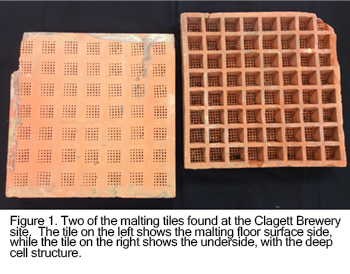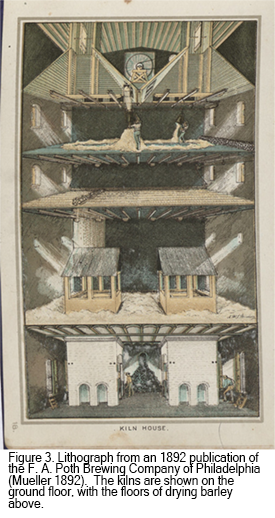Curator's Choice 2021
“Let No Man Thirst For Good Beer”
June 2021 By: Patricia Samford, MAC Lab Director

This pithy quote is attributed to American Founding Father
and Revolutionary War hero Samuel Adams. More importantly here, Adams was also involved
in the brewing industry as a maltster.
Several generations of his family produced malt—a vital component in
beer (Baron 1962:462). Pierced tiles (Figure 1) were used in the floors of
malting houses.
Archaeologists working for the Baltimore Center for Urban Archaeology found these tiles during a 1983

excavation at the site of the former Clagett’s Brewery (Comer et al. 1984). The brewery began producing ale in 1784 and operated until 1880 under as many as ten owners, including Eli Clagett (Akerson 1990). In addition to discovering the foundation of the brewery’s malthouse, other artifacts related to the brewery operations were found, including several dumps of nineteenth-century bottles. More unusual were over three dozen perforated unglazed ceramic tiles used as flooring for the malting kiln. Manufactured in England by two companies in operation in the second and third quarters of the nineteenth century (Figure 2), each tile measures one-foot square and contained 1600 small holes (Bromwich 1984). Hot air passed through these holes to enter
the drying room from the floor below, preventing the sprouted barley from
growing so that it could be used to produce malt (Figure 3).
Baltimore, once the second largest city in the United
States, has been home to over 115 breweries since the first brewery began
operation there in 1748 (Arnett et al. 1999:274). Beginning in the mid-nineteenth century, the
arrival of immigrants from Germany brought about a wave of breweries producing
light German lagers; more than fifteen breweries are shown on the 1869 Sasche map
of Baltimore (Sasche 1869). The brewery industry remained vibrant in Baltimore
until Prohibition.
References
Baron, Stanley Wade
1962 Brewed
in America: The History of Beer and Ale in the United States. Boston:
Little, Brown.
Bromwich, David
1984 Letter addressed to Charles Cheek, dated April
5, 1984. Somerset County Library,
Taunton, England. In BCUA files at MAC
Lab.
Comer, Elizabeth Anderson, Charles Cheek and Elizabeth
Hartley
1984 The Great Baltimore Brewery Dig: Excavations at an Eighteenth-Century
Industry. Draft report on file at MAC
Lab.
Mueller, A. M. J.
1892 Souvenir
Album. F. A. Poth Brewing Company,
Philadelphia. Avil Printing Company. http://brookstonbeerbulletin.com
Sasche, E.
1870 E. Sachse, & Co.'s bird's eye view of the
city of Baltimore, 1869. Library of Congress Geography and Map Division
Washington, D.C.